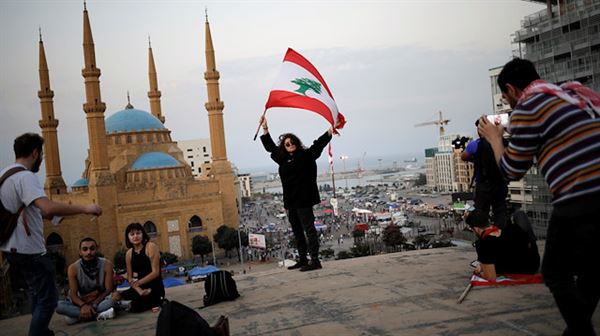Lebanese bank deposits are safe and there is no need to panic, the head of the banking association said on Saturday, seeking to calm nerves about rest
Lebanese bank deposits are safe and there is no need to panic, the head of the banking association said on Saturday, seeking to calm nerves about restrictions on some withdrawals imposed after nationwide protests.
Already facing the worst economic crisis since the 1975-90 civil war, Lebanon has been pitched deeper into turmoil since Oct. 17 by a wave of rallies against the ruling elite that led Saad al-Hariri to resign as prime minister on Oct. 29.
Crowds of protestors gathered again in central Beirut on Saturday, growing steadily into the evening, waving flags and playing music through loudspeakers. Demonstrators also took to the streets in Lebanon’s second city of Tripoli.
Since reopening a week ago, banks have been seeking to stave off capital flight by blocking most transfers abroad and imposing curbs on hard-currency withdrawals, though the central bank has announced no formal capital controls.
“We confirm that depositors’ money is safe and what is happening has nothing to do with solvency and therefore, no need to panic,” the head of the Association of Banks in Lebanon, Salim Sfeir, told a press conference.
Sfeir spoke after meeting President Michel Aoun, the ministers of finance and economy, the central bank governor and other officials over the economic situation.
In recent days, importers of fuel, wheat and medicine have said they faced difficulty securing the foreign currency needed for their purchases.
Economy minister Mansour Bteich said the Central Bank Governor Riad Salame reaffirmed that the funds for these strategic goods were secure, Lebanon’s al-Jadeed TV reported.
“We request the central bank governor, in cooperation with the banks association, to facilitate the necessary needs for depositors, specially small depositors, to preserve their economic and social situation, in addition to the necessary facilities to ensure the sustainability of the productive sectors,” Sfeir said.
One protestor said that people taking to the streets was a reflection of the bad economic situation, which she said could not get any worse.
“The economic situation was so bad, people could not continue anymore,” said Nadine Sangari, a public sector employee.
Caretaker Finance Minister Ali Hassan Khalil said the government would delay a $2 billion Eurobond issue that was planned for the end of the month but is fully committed to paying its maturing debt on time.
“Lebanon is committed to paying maturing treasury bonds in foreign currency, Eurobonds, at their predetermined dates and this commitment is confirmed,” Khalil told Reuters.
Lebanon has a $1.5 billion Eurobond maturing this month. The central bank has said it stands ready to pay off Lebanon’s maturing foreign currency debt.
